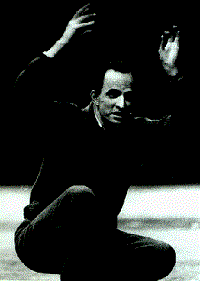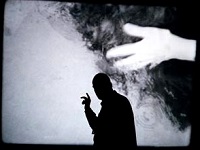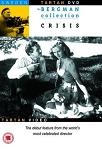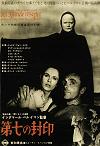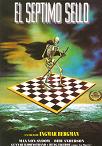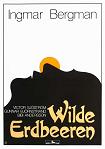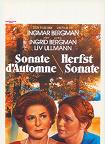| Ingmar Bergman 2020: Some new, official and sealed UK Dvds (Tartan Cinema) in stock again. Ingmar Bergman has never set out to be less than demanding; and as an artist his greatest achievement is in digesting such unrelenting seriousness until he sees no need to bludgeon us with it. The early Bergman worked with the split personality of someone who believed in his own genius. Even his comedies - Waiting Women and Smiles of a Summer Night - were philosophical disquisitions on the nature of love and identity...more The Seventh Seal, like Elvira Madigan (1967, Bo Widerberg) some ten years later, was the film that brought him the greatest attention outside of Sweden. In England and America it made Bergman the central figure in the growth of art-house cinema. Many people came to Bergman's early films after The Seventh Seal and Wild Strawberries had come to represent "artistic" cinema. Suddenly revealed to a volatile world, it seems no coincidence that those two films were seen to some as his most pretentious and calculating. Not for me though as I consider The Seventh Seal to be the greatest film ever made and parts of Wild Strawberries to have the marks of genuius that no one other than Bergman could have produced. But within a few years he was being mocked and parodied for his earnestness and symbolism. The young cineastes led to the art houses were rediscovering the virtues of the American films that had delighted them as children. The new French cinema endorsed that love of development and replaced Bergman's concentration with improvisation, humor, off-hand tenderness, and a non-Northern feeling for the beauty of camera movements as opposed to the force of composition. By about 1961 Bergman held the unenviable position of a discredited innovator in a fashion-conscious world. That reputation was, I think, undeserved. So Close to Life, The Face, The Virgin Spring, and The Silence suffer because the artistic virtuosity seems complacent beside the professed anguish of his work. Time has turned that perception on its head; Bergman's work seems to have become more insightful with age whereas so many films of that age from other esteemed directors of the era just can't get out of the stranglehold of the 1960s. It is worth stressing the dilemma Bergman found himself in at this time because of his response to it. He was not the first figure from Swedish cinema to be invited to more lavish production setups. His international success had made him possibly the best known of living Swedish artists, a spokesman for the rather precious political neutrality and social enlightenment that Sweden embraced, and the prophet of its overriding sense of guilt. What has made Bergman a great director, it seems to me, is the recognition that he was (or had become) his own subject, that the anguish in his films could become central. For that to work, he had to decline attractive invitations and stay in Sweden. At first, that was commented on as evidence of the detail and authenticity of his films. But Bergman made that company into a family and saw that the basic human predicament had a marvelous metaphor in the way that an artist treated his subject and his collaborators. It arose naturally from his convictions of the harrowing separateness of people, the intractable privacy of men and women even in love, that everyone was not a solid identity but an actor trying to play the self. Once those realizations were made, Bergman's style underwent a magisteral simplification. Allegory and symbolism were abandoned for the total unity of action and significance in, first, Persona. That was the beginning of a sequence of masterpieces in which the pessimism Bergman had always held to became unaffected, personal, and deeply moving. In terms of style, these more recent films are strenous close-up investigations of actresses and artists playing actresses and artists. One cannot approach these films without keeping careful check of the names of characters and the interchange of such players as Max von Sydow, Ingrid Thulin, Liv Ullmann, Bibi Andersson and Gunnar Bjornstrand. Bergman himself had been married five times, he has had a child with Liv Ullmann, and there seems no reason to be disconnected by the completeness of his involvement with his "family". It is essential to the autobiographical resonance that his films now give off. In that context, the artist/actor is his everyman figure, and a more fruitful one than the morality-play knight in The Seventh Seal. Persona is about an actress who has a breakdown. She dries up on stage and becomes speechless in life. Alone on an island with a talkative nurse, she listens and gradually absorbs the nurse - part actress taking up a new role, part emotional vampire. Hour of the Wolf is about a painter living on an island, reviled by outsiders, insecure in his marriage, and about hs descent into insanity. Shame is about a musician and his wife living on a Baltic island at a time of unexplained war. Their brittle love cracks apart when war intrudes on them, and the film concludes with feeble refugees adrift on the Baltic. The Rite deals with a trio of players, incestuously involved, whose performance is being investigated by a provincial magistrate. A Passion is an intricate circular story of one broken marriage being cyclically re-enacted. And The Touch, the first of Bergman's films to use American money, is a subtle commentary on modern Jewry and on Sweden's relation to the world, told through an intimate triangle love story. It is the sense of intimacy that most distinguishes Bergman. Artistically, it involves quite as much frankness as do Warhol's films. Bergman insists on the truths of how people feel toward others they need to love - in his TV play, The Lie, as much as in his films. Neither will he ignore the increasing moral paralysis and mental breakdown that follow from that truthfulness. Thus his films are intimate and extreme at the same time. The close-up examination of the family, in rites or games that mirror the family's own situation, was wonderfully sustained from Persona to Cries and Whispers. Bergman claims he is retired from directing films: The Best Intentions (1992), was filmed by Billie August. In which case, Fanny and Alexander and his autobiographical books, The Magic Lantern and Images, must stand as his final gifts. Fanny and Alexander may be the gentlest of his great films, and the most intricate restaging of his own past. Bergman has survived his own fashion. His stature is secure, and the films are there for the ages. The very early films are now in need of rediscovery - but that will only prepare fresh generations for the journey through his career. For so many people, Bergman has been the man who showed the way to a cinema of the inner life. Retirement still left the loophole of television, where Bergman has written and directed three "plays." These include Faithless (2000, Liv Ullmann) shows a genius undiminished, just as Faithless is a vital work in Bergman's harrowed observation of himself. Film director Ingmar Bergman has revealed that he has a secret daughter from an affair conducted with a Swedish countess in the 1950s. The admission came in the 86-year-old's newly-published memoirs, co-written with his daughter Maria who was born to Bergman and Ingrid Von Rose in 1959. She was not aware that Bergman was her father until she was 22. He finally married Von Rosen in 1971, when she became his fifth wife. She died of stomach cancer in 1995. Jan. 2020: Some of the titles below are back in stock. 2016: Below is a list of Bergman films on Dvd available in the UK. These are currently in stock though some are only in multiples of 1 or 2! The UK company who released Bergman, Tartan Dvd, went out of business in 2008 and were not making this title anymore. Those sold at online retailers and shops are just what they have in stock and which can't be replaced. For example, this film is becoming incredibly hard to find now as it is Bergman's best seller and stockists can't replace it once they have sold all their available copies. As of 2016 no company has yet come in to release the Bergman titles. So at some point if things don't change stocks are going to dry up which is weird when you consider that these are the films of Europe's greatest 20th-century film director. On September 28, 2008, the newly named Palisades Tartan started releasing the titles but the releases have been all over the place. Some come and go out of circulation seemingly at will. For example as of June 2011 one of his most popular releases, Persona now seems to be disappearing. How on earth can that be? And forget about the massive 2006 Dvd boxset, The Ingmar Bergman Collection One great thing Palisades Tartan did was release a remastered Fanny and Alexander. In my experience that is his most popular title. While Tartan and Palisades Tartan should be applauded for these releases and for the extra features on each Dvd, I have to say that I have always found the artwork disappointing. It is just lazy: a black & white photo still from each movie on the cover with the title, and that's all you get folks. Imagine if they had hired an even half-decent graphic designer! Whatever you think about Bergman no-one can deny that iconic imagery is in abundance in his films. You could make each release into a work of art! It is a little sad that an opportunity has gone begging. Nov. 16: sourced a few of the titles. Will update by individual page. From 2011 to the present the releases have been all over the place. Grad the titles where and when you can. © Paul Page, 2016 |







